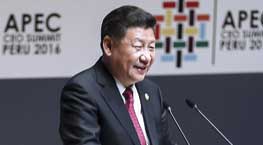BEIJING, Nov. 28 (Xinhua) -- Compared with the state sector, China's private businesses are vulnerable in terms of property rights, but that may change as new policy expands the safety net.
On Sunday, a guideline on property rights was issued, the first by the central authorities. It seeks to ensure uniform, legal protection for all kinds of property rights for all individuals and entities.
Securing property rights will raise people's sense of wealth security, foster positive expectations and confidence and raise the impetus for entrepreneurship and innovation, according to the guideline.
Although China has been gradually improving its property rights protection system, incidences of state power infringing on private assets and illegal seizure of non-public assets still occur.
The flawed system has, to some extent, undermined the confidence of private investors. The problem has been aggravated by the slowing economy, and, as the private sector regularly contributes more than 60 percent of China's GDP growth and provides over 80 percent of jobs, the time is ripe for change.
Chang Xiuze, a macroeconomic researcher with the National Development and Reform Commission, blames the drop in private capital investment on a lack of confidence in the business community, especially among private businesses.
Although fixed asset investment by private companies increased 2.9 percent from January-October, the rate was much lower than the 8.3-percent growth of overall fixed asset investment. Historically, these two indicators usually moved in tandem. In contrast, state-sector investment was up by 20.5 percent.
Sunday's guideline should help restore confidence. It promises that open cases that remain unresolved for historical reasons will be dealt with appropriately, and an accountability system shall protect against questionable court rulings.
The decision to see irregular actions in the past in a historical and dialectical perspective would set entrepreneurs' minds at rest and encourage investment, according to Chang Peng'ao of Peking University law school.










